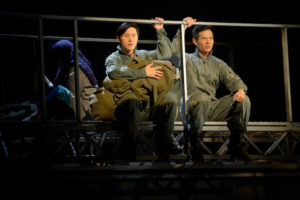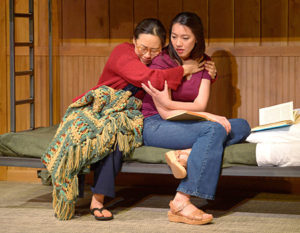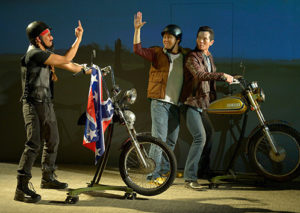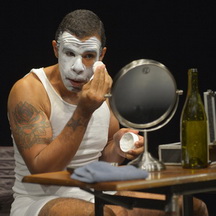Vietgone, the 2015 play by Qui Nguyen, recently opened at A.C.T,’s Strand Theater. Like many of the productions given at this intimate house with its ultra-contemporary feel, the play is edgy and transformative, attempting to showcase a wider perspective on the community in all its dazzling diversity. And like many of the performances presented, Vietgone is intriguing and entertaining, even as it steps outside the strictures of classical theater.
Vietgone is a celebration of Nguyen’s parents, who were among the wave of Vietnamese immigrants that came to the U.S. immediately following the fall of Saigon to North Vietnamese troops in April 1975. Nguyen’s fictional father, Quang (James Seol), is a helicopter pilot trained by Americans and part of the South Vietnamese army. He and his friend Nhan (Stephen Hu) are a couple of bored army guys up until the moment of the evacuation, when they need to fly pro-American Vietnamese out of Saigon, inadvertently leaving behind Quang’s wife and children in the turmoil of the Americans’ hasty retreat.

Tong (Jenelle Chu), a spicy and independently minded young woman, is also evacuated with her mother (Cindy Im), leaving behind her beloved brother and family, though the reasons why she is evacuated remain unclear. Both Quang and Tong end up in Fort Chaffee, Arkansas, one of the four transitional camps of the war’s refugees. There, in a desolate American South, they get it on like the proverbial house afire. As much as Quang desires bad-girl Tong, he still dreams of returning to Vietnam, and the play’s action is about his attempts to fulfill and, ultimately, lose that dream.
The most compelling part of the very funny script is Nguyen’s clever and original use of language. The Vietnamese characters speak standard English, flourished with slang and up-to-date colloquialisms, while the Americans speak a parody of incoherent English, full of mass-cultural references. “Bacon cheeseburger MacDonalds … Nixon yum yum,” cants an American soldier. “Nascar Botox frickles.” It gives us a clear sense of what Americans may sound like to non-native speakers, as well as making the Vietnamese speakers the norm and the Americans the inarticulate, bumbling their way through pidgin English, a language turned foreign.

It’s only in the rap scenes that the language loses its incisiveness and freshness. At several moments the characters step away from the play’s action to rap out what they are feeling. What they have to say and the language it’s said in are simply not as interesting as the rest of the text. Nguyen and his team have a personal connection with rap, but these interludes don’t make the script any more accessible or powerful. If, as the playwright asserts throughout the play, the Vietnamese are as human as any other human and their stereotypical portraiture by Americans inadequate, then there is no need to have them explain their feelings in such simple terms. We know what they feel. It’s built into the action of the play and the characters’ clear humanity.
The play is divided into short snappy scenes, which are realized by a brilliant production. Employing a catwalk-like structure above a turning round-table stage, the media-enhanced sets whirl the audience through the play’s many changes in time and place. Each change announced by super large text that journeys, like the players, over the surface of the sets. “Fort Chaffee 1975,” they announce, “Amarillo, Texas,” “Saigon, 1974.”

The kernel of the play, the moment that all the action moves toward, is the ending dialog between the character portraying the playwright (Jomar Tagatac) and his father Quang, in which Quang’s feelings about the war are revealed. “My life is more than the eight years I was fighting,” he says. He then chides his son to not apologize for American interference, but to think of the soldiers involved: “No person,” he adds, “wants to see his life is a mistake. No death should be a mistake.”
Wonderfully acted by a cast of five, slipping in and out of multiple roles, and directed with energy and thoughtfulness by Jaime Castañeda, Vietgone continues at the Strand through April 22. For tickets and information, visit act-sf.org.
– Jaime Robles
